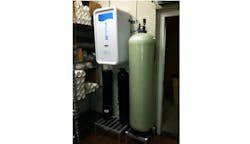About the author: Kirsten Martenson is former director of marketing for HydroNovation Inc. For more information, contact Mark Bertler at [email protected].
About 55% of adults in the U.S. drink coffee daily, according to the National Coffee Assn. Coffee shops have helped consumers develop an appreciation for specialty coffee. Higher-grade coffee beans, improved roasting methods and better brewing equipment have improved product quality and increased customer expectations. Because coffee is about 99% water, water quality is critical to the brewing process.
Minerals in tap water can be a double-edged sword to beverage retailers. A certain amount of hardness is required for a pleasant taste and proper extraction of the coffee bean. On the other hand, minerals in water can lead to limescale, which can cause problems for brewing equipment. A balance must be reached to protect brewing equipment while still capturing the desired flavor and aroma of the coffee.
A new system from HydroNovation Inc., the HydroDI, achieves these goals by providing consistent performance and premium water for beverages and protecting brewing equipment long term. The salt-free system provides chemical-free water conditioning for beverages requiring consistent flavor.
The system reduces total dissolved solids (TDS) and hardness for optimal drinking water quality. It eliminates the need for chemical additives such as salt by applying a process called electrodeionization. The semiconductor and pharmaceutical industries have used this technology for the past two decades to produce high-purity water on a large scale. HydroNovation adapted this patented electrochemical technology to the specific requirements of beverage retailers.
“The HydroDI is the first commercially available, exclusively salt-free water treatment system that actually produces a higher-purity product water,” said Mark Bertler, vice president of sales and marketing for HydroNovation. “This system uses ion exchange membranes and electricity to produce a scale-free, bottle-quality drinking water throughout the home or commercial establishment, accomplished without the use of any chemical regenerants.”
Changing Regulations
Hard water, a widespread problem in the U.S. and worldwide, contributes to scaling, which reduces the life and efficiency of plumbing, fixtures and brewers. The traditional solution of salt-based water softeners can cause concentrations of sodium chloride in wastewater, an increasing concern to municipalities. As a result, regulations are being introduced in some areas either limiting or outright banning the use of these traditional systems.
“Over the next few years, the rest of the U.S. will likely see regulatory pressures similar to California’s regarding brine restrictions, and this emerging technology that replaces a traditional water softener will become a welcome alternative,” said former Pacific Water Quality Assn. President Mike Mecca, director of marketing for Performance Water Products.
According to study conducted at Michigan State University, 84% of specialty food consumers undertake sustainable practices at home and support sustainable practices in their communities. The HydroDI system manufactures soft water while controlling TDS — a formula that produces high-quality beverages in a consumer-friendly method.
SoCal Coffee Installations
The Coffee Bean & Tea Leaf LLC (CB&TL) operates and franchises more than 800 coffee shops located primarily in Arizona, California, Hawaii, Nevada and Texas, featuring fresh-roasted coffees and specialty teas, plus baked goods and blended iced drinks. The retailer has installed HydroDI systems in six of its Southern California locations over the past 12 months, and plans to expand the program this year.
The CB&TL installations use a single-tank system to provide safe, high-quality water for every beverage. The system provides control of levels of unwanted minerals and chemicals that change daily based on the area’s dual-sourced incoming water. Additionally, the technology lengthens appliance performance by eliminating the potential scale buildup that could create longer downtime and shorten the lifetime of heating elements, valves, solenoids and reservoirs.
“Competing technologies (if not restricted) either are still too high in total dissolved solids or are too low to meet our beverage feedwater quality specifications,” said Arne Luoma, director of facilities and maintenance for CB&TL. “The ability to ‘dial in’ final product water quality using an environmentally friendly technology meets all of our needs. At CB&TL, we view our water as another critical ingredient to our beverages. Simply put, better water means better beverages.”
Download: Here
